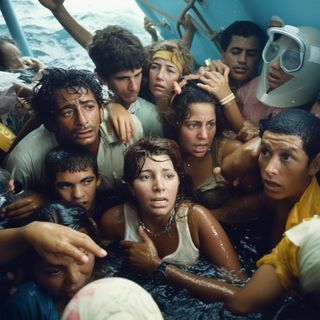The world of photography really is changing, and it's a bit scary. Well-known National Geographic and New York Times documentarian, Michael Christopher Brown, has taken to new methods in the creation and distribution of his photojournalistic series, 90 Miles, with a distinct focus on Cuban historical events and crossing the border.
Using an artificially intelligent computer instead of a camera to create images for a photo project is one thing, but then minting them as NFTs instead of selling prints might be the cherry on the cake that has other photographers upset with Brown.
• This is everything you need to know about AI image generators.
Michael Christopher Brown is a phenomenal photographer known for his reportage documenting the 2011 Libyan Civil War, and can evidently capture incredible images. So why the need to be using AI image generators to create a new and engaging “post-photography” photo series, when he's already a sharpshooter with a digital camera? The reason is actually quite valid, at least in our opinion.

Brown explains that 90 Miles, his new AI-generated project with a focus on historical events involving the oceanic distance between Havana and Florida, couldn't have been possible without using the AI photo software Midjourney. Brown describes the project as a "post-photography AI reporting illustration experiment exploring historical events and realities of Cuban life".
"The photorealistic quality now possible with AI, and the ease in creating that quality, is expanding the possibilities of visual storytelling." Shares Brown. "Anyone may now create lensless, photo-realistic reportage illustrations on any subject anywhere, at any time, collaborating with a collective history of photography to illustrate the photographed world and create a vision of what was, is, or can be."

"This is, of course, a delicate dance as we must maintain the integrity of the photograph and create barriers around certain AI outputs. But we must also use it to our advantage" he proposes.
Very vocal on his Instagram account, Brown has also said that "For over 25 years, I kept a list of subjects to document but was unable to, mainly due to access or that access was impossible. While working in Cuba from 2014-2016, more subjects were added to the list with the assumption they would likely never be created."
The images in the series created by Brown are admittedly pretty great and ultra-realistic for the most part. And without close inspection, the images would never be considered AI generated at first glance, although there are a few misshapen faces and missing fingers when you really look. The photographer says that 10% of the proceeds from NFT sales will go to charities working with Cuban refugees.
Despite the extreme backlash that the photojournalist has faced for creating the series, props have to be given to Brown for at least giving it a go in a professional context and attempting to use new technology that most of the industry has collectively boycotted. But is it fair to be profiting from a depiction of struggle?

The scariest part about AI image generators is that they do a very convincing job. While some AI images have subtle clues that give away their nature, and others can be detected almost immediately, there are plenty of digital AI images out there that are perfectly generated, have easily fooled the internet, and even won prestigious awards without anyone getting suspicious.

We were warned years ago to never believe what we see or read on the internet, but it's never been more true until now. A fantastic article by Dina Litovsky really hits the nail on the head surrounding the issues involved with AI and why Brown seems to be getting the brunt of the industry's rage.
"The intensity of reaction to Brown’s work startled me", she writes. "Photographers rarely turn on one of their own with such viciousness...no safeguard could have prepared the industry for the AI Trojan Horse arriving on its doorstep".

In speaking of the decision process to utilise AI for his project, Brown said, "Access to the story was impossible for me as a photographer, so I imagined what a collaboration with AI might look like. I made a list of words to use in prompting the AI generated imagery, referencing a variety of aggregated research to supplement my knowledge of the story."
"As a result of working against the Midjourney engine, the imagery often has non-identifiable faces, weird body parts, etc. I accepted this as both indicative of the quality of today’s readily accessible AI as well as perhaps a more baseline, 'objective' interpretation by a confused AI engine."

"Of course, I had no idea what major historical events in Cuba like the Maleconazo or the Mariel boatlift or the Special Period were like, but attempted to understand the human stories behind them. A great potential of AI is an ability to utilize the power of photographic looking imagery in storytelling, giving us an ability to tell stories that were impossible until now."

As an industry, what do we do about AI photography? Is there anything we can or should do? We seem to have two choices; embrace it or reject it. Michael Christopher Brown has given AI a chance - but would you? Let us know which side you stand on!
• You might also be interested in the best camera for portraits, plus the best lenses for portraits, and not forgetting the best books on portrait photography for real-world examples of how to shoot documentary portraiture.
• Take a look at the best AI image generators, as well as the best noise reduction software, plus the best photo editing software, and see our review of the Topaz Photo AI software.


